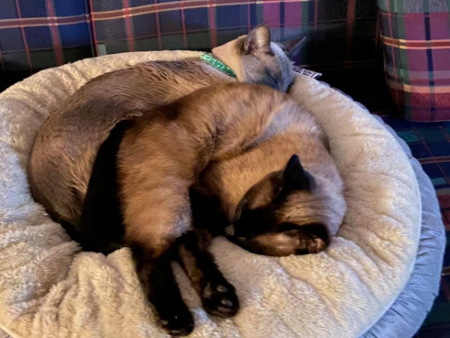- Home
- Meezer Musings
- February 2020
Meezer Musings: February 2020
Counting the Cost of Veterinary Bills
Welcome to February's Meezer Musings! This month, sparked by a question from one of our readers, we're taking a look at veterinary costs - an ever-present reality for all pet owners.
Veterinary fees are increasing all over the world; along with medical bills, they're probably one of the fastest-rising costs. Why is this? And how can you make sure you're able to pay those bills when they arise, as they most definitely will?
This newsletter is based on one I wrote a few years ago, but it's always worth taking a fresh look at things so what follows is a checked and updated version that also contains some new ideas and options.
 Can you afford to pay your vet?
Can you afford to pay your vet?Image © iStockphoto | tadija
Why Are Vets So Expensive?
I'd be willing to bet that all of us are concerned about the rising cost of veterinary care. In parallel with advances in human medicine, veterinary medicine has changed considerably in the last fifty years, as this article by Dr Karen Becker explains.
Once upon a time, vets used to provide fairly basic primary care services for pets but not much more than that. However, treatments have become much more sophisticated and nowadays veterinary practices are very often able to offer a range of specialized treatments including blood tests and x-rays; ultrasound, CT, and MRI scans; and complex medical procedures.
Even if they don't provide all of these facilities in their own clinics, the chances are that they'll be able to refer you to an animal hospital that does.
Vets need to be skilled diagnosticians, surgeons, emergency medicine experts and a lot more besides and their long veterinary training doesn't come cheap. Neither do the buildings, equipment, drugs and staff needed to maintain and run a modern veterinary practice.
And all of these costs are passed on to us.
Most people would pay anything, do anything (including going without food themselves) to ensure their pets are healthy and pain-free.
But even in the best-regulated life, crises such as illness, job loss, divorce or the need to pay other urgent, unexpected bills mean that there's no money left over to pay for veterinary treatment when it's needed.
Below, you'll find a range of options and ideas on how to fund your pet's veterinary care. First, let's take a look at pet insurance.
Considering Pet Insurance
In one of the cat groups I belong to I recently read a comment from someone who said that if they could have their time with their cat over again, the one thing they'd do from Day 1 would be to set up pet insurance.
I agree with this, as having insurance can give you a great deal of peace of mind but weighing up whether or not to take out insurance, and if so, what kind, can sometimes be a difficult decision.
No-one wants to pay out a lot of money if treatment isn't going to be necessary but it's almost certain that at some stage in your pet's life, treatment will be needed, and the advantage of having pet insurance is that it can help to pay major, unexpected bills.
On the minus side, pet insurance doesn't cover routine costs - things like annual vaccinations, check-ups, dental cleaning or neutering/spaying.
And insurance premiums and any excess (the amount you must pay yourself, before you receive an insurance payout) both rise with age, so as your cat gets older, you have to spend more before receiving any insurance benefit just at the time when your cat is likely to need it most.
The Different Classes of Pet Insurance
How do you decide what sort of insurance to take out? It can all be a bit of a minefield! Different insurance companies will have different policies but there are generally three main classes.
Lifetime (also known as 'covered for life')
This cover is provided for unexpected annual veterinary fees up to a set amount. As long as you renew the policy every year without a break, there's no time limit on how long you can claim for any particular illness.
This type of policy is ideal for ongoing conditions - diabetes, for example, or kidney disease - but the catch is that you have to take out the policy before your cat is diagnosed with anything that might incur ongoing costs. Most insurance companies will exclude pre-existing conditions.
However, if you meet the criteria, this type of policy means that you can claim for a condition in Year 1, and then again for that same condition in Years, 2, 3, 4 etc. as long as your cover remains unbroken.
Time-limited
This is a cheaper option than Covered for Life, but cover is only provided up to a maximum amount per condition. There's a time-limit (generally twelve months) which means that any one condition will only be covered for that amount of time. After twelve months, that condition will be excluded from the policy.
Maximum benefit
Cover is provided up to a maximum overall amount per condition. This is not limited by time, but once you've claimed the maximum amount for any particular condition, that condition is then excluded from the policy.
What Else Could You Do?
If you don't want or can't afford to take out pet insurance, one alternative is to set up a savings account of your own that's kept purely to pay vet bills as they arise.
The advantages:
- you have control over how much you pay in and save
- you're not paying for something you don't need
The disadvantages:
- it you're not careful, you may be tempted to use those savings for other, more urgent things
- however much you put in, you may not save enough for the high cost of major surgery, or to cover a long-term illness needing ongoing treatment.
Some vets have their own 'savings plans' which allow you to pay a monthly fee towards the cost of routine treatments, so it's worth checking this out, too.
Other Funding Ideas for Unexpected Costs
I'm occasionally contacted for help by readers who can't afford to pay big vet bills, sometimes in life-or-death situations.
No-one wants their cat to suffer or
go without necessary treatment through lack of money, so if this ever
happens to you or anyone you know, here are a few ideas.
First and easiest! Start by asking your own vet if they'll allow you to pay off your bill in monthly amounts. Some will, some won't, and they may ask you to provide your credit card details as a guarantee of future payment, but it's worth a try.
After that - it rather depends which country you're in. In the USA, the Humane Society of the United States has a comprehensive list of places providing financial assistance to pet owners in need - these include listings by state, so you can easily find the resources closest to you.
One option might be to apply for CareCredit, a credit card that allows you to pay for both human and pet health care through staged payments.
Another possibility might be to apply for a loan through Scratchpay, which offers pet owners a range of payment plans for loans of up to $10,000. Applying for a Scratchpay loan will not affect your credit score, and Scratchpay works with veterinary clinics across the USA and Canada, so could be worth a look to see if there's a clinic near you.
For non-urgent, non-basic care for pets (things like cancer, heart disease, and chronic conditions) you may be eligible for a one-time grant from The Pet Fund (USA residents only). The Fund receives thousands of applications and there's a long waiting list for help, but it might be worth applying to them if you meet their criteria.
In the UK, the animal charities the PDSA and Blue Cross could be places to start.
And wherever you are, veterinary schools and rescues may provide some low-cost veterinary treatments and procedures like spaying and neutering.
Consider Asking for Donations
In these days of social media and crowdfunding, setting up a request for donations on a site like GoFundMe might be one way to go.
And a crowdfunding platform created specifically for pets, Waggle provides tools and templates to help pet owners to create and run successful fundraising campaigns for veterinary treatment. Waggle ensures that 100% of funds raised go directly to your vet to pay for care.
Tail End ...
I hope the above has provided you with some useful resources but if you have any other ideas (or if you've tried any of the above and have further information or thoughts about them) or know of similar resources in your area, please send me a message and I'll add them to our list.
Before I go - a couple of updates ...
Shortly after I sent out last month's Meezer Musings I received an email from reader Fiona who told me about the steps she'd taken to find her missing cat.
You can read about them in the update I added to that page, but it's worth pointing out one especially useful point made by Fiona, which was about the importance of social media (Facebook, Twitter, What'sApp, etc.) of getting the news and description of your cat out to your social circles and local contacts.
Finally, if you've been here a while you may remember that back in January of last year we talked about redirected aggression, a situation in which previously friendly companion cats turn on each other (and sometimes, on their humans, too).
Almost a year later, Donna Castele reported that her two cats, Jazzmin and Ziva, were finally on cuddling terms again. So if you're having trouble with a pair of cats who hate each other, don't give up - time and patience can often work wonders.
 Ziva and Jazzmin - friends once again
Ziva and Jazzmin - friends once againImage with thanks to and copyright © Donna Castele
That really is all for now! After starting this year with two fairly serious topics I'll be back at the end of March with a look at the best ideas for toys and other playthings for keeping cats active, healthy and entertained!
Have a great month, wherever you may happen to be.
Caroline
Missed a Meezer Musings? A list of previous newsletters can be found here.
Some of the articles and newsletters on this site may contain links to products I think you may enjoy. If
you purchase through these links I receive a small commission, but there's
no extra cost to you. Find out more on the Affiliates Disclosure page.
Have You Discovered Our Newsletter?
If not, why not? Subscribe to our email newsletter, Meezer Musings, to stay in touch, be the first to see new information and pages as they come out, and read the things we only talk about in the newsletter.
Learn more about it on our Newsletter Sign-Up page.




